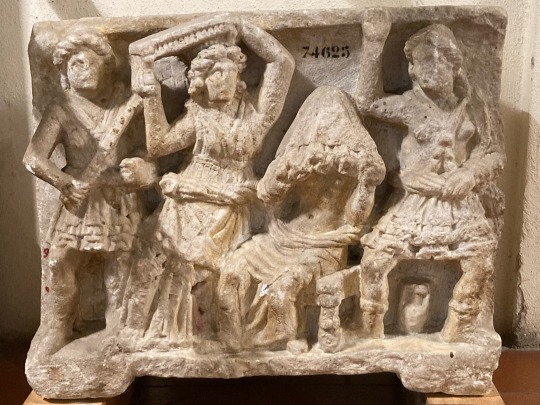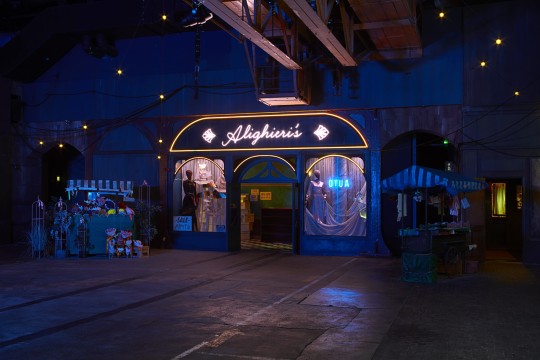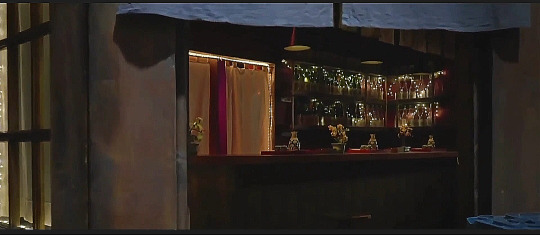Compiling references from and describing my experience(s) of Punchdrunk's The Burnt City
Don't wanna be here? Send us removal request.
Text

Masks from a 1981 performance of the Greek play, THE ORESTEIA. Designed by Jocelyn Herbert.
4K notes
·
View notes
Text
i decided all plays are time loops btw. it’s true because they keep getting performed over and over and over and the ending never changes and they can never escape it. if you even care.
43K notes
·
View notes
Text
agamemnon was killed with a sword vs agamemnon was killed with an axe…… neither of these are correct. the only source i trust is this etruscan funerary urn where agamemnon is killed by clytemnestra bashing him on the head with a chair

23K notes
·
View notes
Text
in middle school during my Intense Greek Mythology Phase, Artemis was, as you can likely guess, my best girl. Iphigenia was my OTHER best girl. Yes at the same time.
The story of Iphigenia always gets to me when it's not presented as a story of Artemis being capricious and having arbitrary rules about where you can and can't hunt, but instead, making a point about war.
Artemis was, among other things--patron of hunting, wild places, the moon, singlehood--the protector of young girls. That's a really important aspect she was worshipped as: she protected girls and young women. But she was the one who demanded Agamemnon sacrifice his daughter in order for his fleet to be able to sail on for Troy.
There's no contradiction, though, when it's framed as, Artemis making Agamemnon face what he’s doing to the women and children of Troy. His children are not in danger. His son will not be thrown off the ramparts, his daughters will not be taken captive as sex slaves and dragged off to foreign lands, his wife will not have to watch her husband and brothers and children killed. Yet this is what he’s sailing off to Troy to inevitably do. That’s what happens in war. He’s going to go kill other people’s daughters; can he stand to do that to his own? As long as the answer is no—he can kill other people’s children, but not his own—he can’t sail off to war.
Which casts Artemis is a fascinating light, compared to the other gods of the Trojan War. The Trojan War is really a squabble of pride and insults within the Olympian family; Eris decided to cause problems on purpose, leaving Aphrodite smug and Hera and Athena snubbed, and all of this was kinda Zeus’s fault in the first place for not being able to keep it in his pants. And out of this fight mortal men were their game pieces and mortal cities their prizes in restoring their pride. And if hundreds of people die and hundred more lives are ruined, well, that’s what happens when gods fight. Mortals pay the price for gods’ whims and the gods move on in time and the mortals don’t and that’s how it is.
And women especially—Zeus wanted Leda, so he took her. Paris wanted Helen, so he took her. There’s a reason “the Trojan women” even since ancient times were the emblems of victims of a war they never wanted, never asked for, and never had a say in choosing, but was brought down on their heads anyway.
Artemis, in the way of gods, is still acting through human proxies. But it seems notable to me to cast her as the one god to look at the destruction the war is about to wreak on people, and challenge Agamemnon: are you ready to kill innocents? Kill children? Destroy families, leave grieving wives and mothers? Are you? Prove it.
It reminds me of that idea about nuclear codes, the concept of implanting the key in the heart of one of the Oval Office staffers who holds the briefcase, so the president would have to stab a man with a knife to get the key to launch the nukes. “That’s horrible!,” it’s said the response was. “If he had to do that, he might never press the button!” And it’s interesting to see Artemis offering Agamemnon the same choice. You want to burn Troy? Kill your own daughter first. Show me you understand what it means that you’re about to do.
20K notes
·
View notes
Text
The Burnt City (2022- ) is mainly a show about shin-high milk crates. As an immersive production, the audience is given complete agency over how many times they bash their legs against them
29 notes
·
View notes
Text



“That’s why you have come here, into the darkness to see the light, not to be told a story but to live inside a dream”
64 notes
·
View notes
Text
Ah, the final loops.
Spoilers below the cut for one of the last punchdrunk Burnt City Performances.
So, I got a last minute ticket becuase I had forgotten it was closing and ended up buying a premium ticket (free glass of prosecco, free cloaktoom, enter at any time) and I'm so glad I did. My last trip there was months ago and this trip let me see all the bits I wanted to before it closed.
My first loop was a partial loop. I came in about 3pm (idk what time a normal matinee started, but my ticket was for 3.15), and coming in I had thought - "I have to see Laocoon's dance to Gripir" and when I walked in, got oriented, the first thing I heard were the Gripir horns. I ended up seeing him first, although it doesn't hit the same without a full loop following him. It's still great! Its just not the same as I remember - which nothing ever is. I spent the rest of the loop with Polymestor, it was a guy I had seen before, who got uhhhh a bit assault-y with Ariadne/the trojan hotel worker/lime green apron woman. I wasn't sure if this was an actor's-choice or a change-in-direction change. Shrug. I find Polymestor interesting as the shadow of male violence hangs over the play and he is no exception. More later.
My second loop I did with Clytemnestra. I got there really early - I normally start my loops in the central troy square because I'm either going to or from somewhere and passing through. This time, I made it to the Mycenae side during the reset. The resets this time felt longer, maybe twice as long as the usual reset time/ The msuic wasn't longer - there was just more ambient waiting music afterwards.
I had never seen the early-loop Iphigenia-as-bear scene before, so getting to see that was new and cool. I actually never did a full Iphigenia loop, but I saw the start fo her loop with Clytemnestra and Aegisthus, and some of the end of her loop with Zagreus. I don't know why Clytemnestra stabbed herself and then Iphi with the antler from the shrine (something something the thing that hurts me will one day hurt you) but I liked the bear costume. I'd only seen it folded up and had assumed it was a bearskin but. no. cool!
Clytemnestra was tragic and beautiful as always; she also swapped cast mid-loop. Right before Sing Sing Sing (the wedding) the actress swapped to the woman I had initially seen as her, which was a nice way to tie it all up. This was the first cast change I saw, but not the only one in the show. Hades was a different guy to usual for Sing Sing Sing too.
I saw the Gods' duel, which is one of my favourite scenes,and at the end of the duel, another two gods came on, and they circled each other like they didn't understand what was going on. The first two left; and the others took over for the remainder fo the show; I suppose that would be the half-way mark as it was most of the way through the second loop.
I really enjoyed the disorienting effect of the cast changes tbh. I was too familiar with the cast and the set and the characters, I found myself planning loops in advance to best optimise my time there, but I sort of realised that this was less fun than the initial wandering I had done in my first few visits and before I made the map. I liked the uncertainty, and I also thought about the Commedia dell'Arte - a cast of characters mostly recognisable by their characteristic costumes and fulfinning the same roles every time.
My final loop I spent in Troy, mostly with Polymestor. It was a different Polymestor to the guy i had seen earlier in the show, his performance was softer, more vulnerable, and also a bit sillier.
I saw the early-loop stuff with Polydorus, Polyxena, the jacket woman and Kampe in Polymestor's club, it was sweet to see them all play together before they all died separately and sadly.
I also saw Polyxena and the jacket woman - I know she had been listed as Polyxena's lover, but this time I saw them meet and fall for each other. It would have been sweet if it hadn't been set to the music for Twin Peaks Fire Walk With Me, which always raises my hackles. Not sure why they picked that music for what is otherwise a nice little moment.
For the first time ever, I saw Chronos* enter Polymestor's office and crawl over the table like BOB towards Polydorus. This Cronos was the previous guy i had seen as Polymestor in the first loop - I think, but I'm not sure because he had white and black paint striped down his face like war paint.
*Still not sure if it's Chronos god of time or Cronos the titan, and I never did his loop to find out.
I had planned on doing a full Polymestor loop but I was so surprised and confused by the appearance of a large story threat that I hadn't ever known was present - I left with Chronos. I followed him in a massive crowd (which was weird) but it turns out he immediately goes on to the 1:1 room, so everyone was following in the hopes of getting that. I didn't get it and I also didn't know it was going to happen until he went into the IIIIIIII room and left a bunch of people in the square. Oh well.
I went back to Polymestor, only to catch Polydorus doing Nautilus in PeeP which was nice. And then he died (sad) and we went into the standard Polymestor loop from there. One notable moment was when Polymestor had dealt with the body, he escaped to the tenements. In the kitchen next to the greenhouses, he took off his shoes and socks off - Polymestor wears lifts. Of course he does - he's the bull. He has to live up to the ideals of masculinity and power no matter how threatened he is.
Then he took his socks off and tied them around his mouth. He kept them there in the scene with Hecuba in the hotel bedroom. IDK man. I reckon it was the actor's choice and he was getting silly with it, but it did give me thoughts about this world's ideas of masculinity and vulnerability - I'll have to make another post about it. It's the minotaur on the floor of the club.
Polymestor left, had an interaction with the moustachioed guy from peep where it did super looked like he was getting his dick sucked in an alley, before heading to the Troy finale. I'm not gonna begrudge the man a quickie before his eyes come off. Troy finale slapped as usual.
I maanged to get over to Mycenae for the second finale, which was better attended than usual. The people from the Troy finale also made it over and did the same performance on the stone table. I was stuck on the balcony so I got a great view but was kept away from the action.
There was an extra post-finale bit for the final show (or, I think there's one more today and a final final one tomorrow), Hades (played by Sam Booth as usual by now - he swapped in before the last loop) stopped playing the record, (implying that it had been looping before) and discovered that there was a second side to the record. Persephone seemed more at ease here than I had seen her previously. Almost happy. The lights went down on the question of what it could be, implying a changed future for all the looping souls. I'm glad and a little bit weepy.
Then I left and dropped my phone, fully destroying the screen and jabbing glass shards into my finger. All things end.
5 notes
·
View notes
Text
i just think it's neat that odysseus gets put in a position where he has to kill his child to avoid going to war and he can't do it and then agamemnon gets put in a position where he has to kill his child to go to war and he does it
62K notes
·
View notes
Text

Aeschylus, Agamemnon (trans. Anne Carson)
8K notes
·
View notes
Text

Happy antigone buried alive friday
11K notes
·
View notes
Text
↖ this user has drank from the infernal river Lethe, which flows through Hades and brings total oblivion, eradicating all memory and thought
70K notes
·
View notes
Text
i decided all plays are time loops btw. it’s true because they keep getting performed over and over and over and the ending never changes and they can never escape it. if you even care.
43K notes
·
View notes
Text
getting that august feeling (things that have ended endlessly are ending again)
99K notes
·
View notes
Text

[Transcript: As John T. Irwin eloquently summarizes, a labyrinth resembles a maze because it is "always open from the outside but appears to be unopenable from within." End transcript]
ok i'm reading about labyrinths for personal reasons and. obsessed with thinking about narrative as something that is 'open from the outside but unopenable from within'... can't stop picturing someone just. stumbling into a story and getting locked in from the inside because all of a sudden the part is cast, their fate is set, and they have a role to play and lines to read... everything is up for grabs until the moment the story starts and then the ending is fixed and you've been buried alive inside a structure that gives the illusion of agency while leading you all the while down the only existing path toward the very center of itself, where what awaits you is death..

[Transcript: to tell a story is to align an already known set of events along an arc. End transcript]
492 notes
·
View notes












